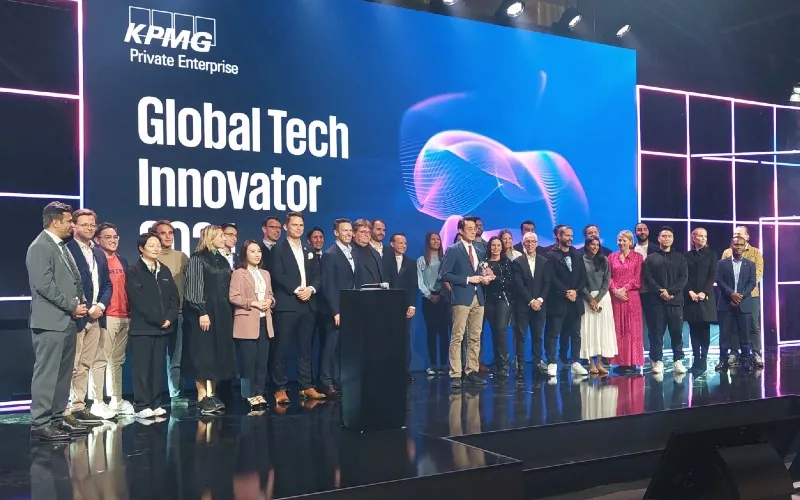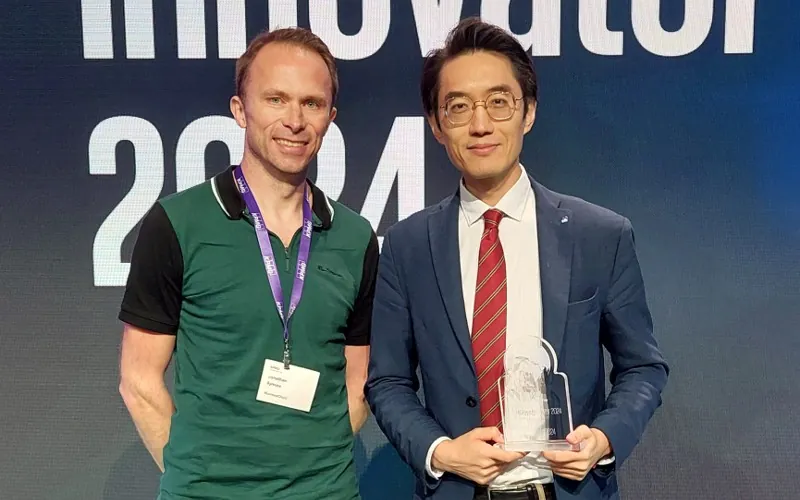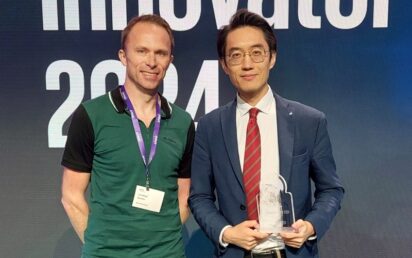Japanese finalist Thermalytica was crowned winner of the fourth edition of the KPMG Global Tech Innovator competition at Web Summit on Wednesday night.
CTO Rudder Wu, a PhD in materials science at Imperial College London, claimed the top prize following pitches from the winners of national competitions around the world.
Japan’s entry is a DeepTech spinout dedicated to providing innovative thermal insulation solutions for key sectors. Its patented technology, TIISA, is a groundbreaking superinsulation aerogel that significantly reduces heat conduction.
The people’s choice award, voted for by members of the audience and viewers online, was claimed by Brazil’s Gabriel Variane, founder of Protecting Brains & Saving Futures – a social enterprise dedicated to the neuroprotection of newborns at risk of brain injury. Its mission is to eliminate preventable disabilities in children around the world.

The final, which played out in front of more than 200 people at the Four Seasons Hotel in Lisbon, saw 23 national finalists pitch for three minutes apiece to a panel of judges.
There were more than 1,500 competition applicants globally this year.
Web Summit in pictures: How to stand out in a crowd the size of Old Trafford
In his pitch, Wu showed a video where a 2mm thick layer of his firm’s insulation on a person’s arm repelled the flame from a blowtorch. The material can withstand temperatures from minus-250 degrees up to the heat of shuttle reentry to the atmosphere, giving it remarkable application across a range of industries.
Wu said he usually takes a blowtorch on stage to demonstrate.
“The difference in thickness is very important,” he told BusinessCloud after he was named champion. “Sometimes you can achieve insulation or temperature difference with any material – as long as you have the required thickness.
“But if you have something with very high insulation performance, you can reduce the thickness. In return, you get a lot of benefits: for example, refrigerators: one of the most important considerations there is the dimensions of the product – will it fit into your kitchen?
“If you have a high performance insulation material, you can have much larger inner space to store food and beverages.”
He continued: “Here at Web Summit, there are so many innovative technologies – and sometimes we just ask ourselves: which of these can actually solve our current, rather than future, problem?
“Our problem right now is the climate crisis… transitioning to renewable energy is important, but it takes time. It is equally important to solve our current issue, and our solution can be used right away to reduce the energy consumption of our daily life.”
Conor Moore, global head of KPMG private enterprise, KPMG International, said: “Each finalist company is an impressive example of a brilliant idea that could transform the way the world works, lives and thrives.
“These founders have the potential to become tomorrow’s tech giants. KPMG Private Enterprise is proud to have this opportunity to introduce them to you … and to the world.”
The UK was represented by Dr Henrietta Boyd of Hull-based Halocycle, which has a vision of a circular lifecycle for PVC and other chlorine-containing plastics. It already has a pilot plant in the city deploying established microwave processing technology in an innovative fashion.
‘The sea plastic on David Attenborough? It came from your recycling bin’
Halocycle is now raising further funding to build its first commercial-scale facility.
Nicole Lowe, UK head of KPMG’s Emerging Giants practice, said: “Halocycle is a fantastic example of a UK business that has a very commercial technology which could solve a huge and really important global issue.”
Over the years the UK competition – which has been running since 2013 – has uncovered outstanding tech from businesses including What3Words, Inovus Medical and HiiROC, who went on to win the global final during Web Summit in 2022.


